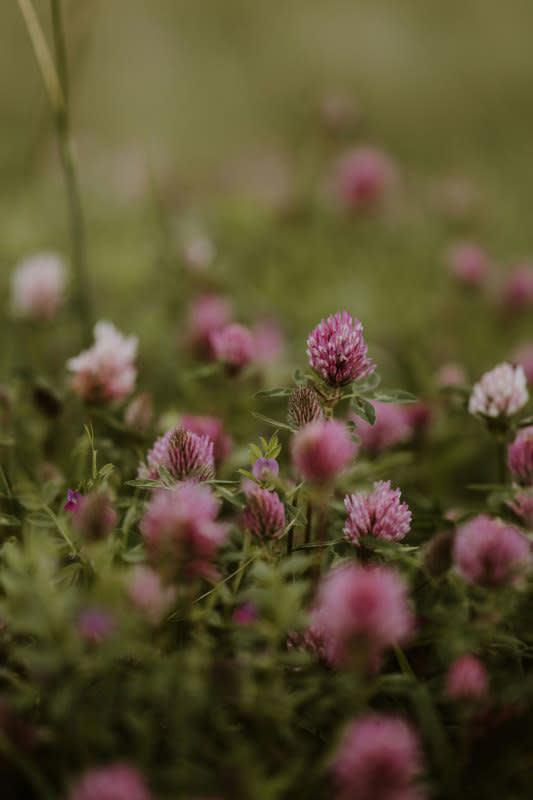Why You Should Consider a Clover Lawn Instead of Grass
As we stare down the calendar straight into lawn mowing season, we can't help but wonder if there's a more environmentally friendly and low-maintenance option. Turns out, we're not alone. Clover lawns are growing in popularity, and for good reason. Maybe it'd bring some luck, but more likely, homeowners are starting to recognize that it's a smart alternative that improves our soil.
What makes a clover lawn so great?
Our friends at Tractor Supply shed some light on the topic. "Centuries ago, in the early days of Ireland, people believed three-leaf (and especially four-leaf!) clovers brought them magical protection and protected them from bad luck—and there’s nothing more lucky than a sea of clovers outside your home! On top of that, entire lawns of clover are extremely sustainable and low maintenance, along with helping to support local pollinators and biodiversity."
On the other hand, traditional grass lawns ("American lawns") require a lot of water (either through rain or irrigation), plus widespread chemical pesticides and synthetic fertilizers to keep them looking lush and green. Weekly mowing be gone. Clover is a hardy plant that requires little to no maintenance.
Wait, clover isn't a weed?
No! Well, not always. Anything can be considered a weed if it's growing somewhere unwanted. Unlike broadleaf weeds, clover is a common plant that is often grown deliberately in lawns and agricultural fields as a type of ground cover. It also spreads easily, which is common of weeds, too; however, this is why you likely see patches of clover around your property or in your local parks.
Benefits of Growing a Lawn of Clover
Clover requires minimal watering and maintenance compared to traditional lawns
Replacing grass with clover can reduce soil erosion during heavy rainfalls
It's a nitrogen-fixing plant, which means it enriches the soil and reduces the need for chemical fertilizers. Furthermore, it can grow in nitrogen-poor soil, unlike grasses.
As a lawn alternative, it attracts beneficial insects and pollinators such as bees and butterflies, supporting local biodiversity. Don't mow it more than once a year; let your all-clover yard help your backyard ecosystem.
Often overlooked, clover is drought tolerant. Ever notice how it stays green and healthy even during periods of drought? What a perk.

Photo by Annie Spratt on Unsplash
5 Types of Clover
There are several types of clover that homeowners gravitate to, but be sure to do your research so you choose a good clover lawn seed for your location and conditions. Native species and popular varieties include:
White Clover (Trifolium repens). White clover types are (perhaps) the most common type of clover used in lawns. It has white flowers and spreads by stolons (above-ground runners) to form a dense, low-growing mat. Even if you didn't intentionally plant clover, white clover seeds are often included in grass seed mixes.
Red Clover (Trifolium pratense). This is another popular choice for lawns. It has pink to reddish-purple flowers and typically grows taller than white clover. It can handle moderate traffic.
Dutch Clover (Trifolium repens var. 5). Dutch clover is a smaller, more compact variety of white clover. It has smaller leaves and flowers than white clover, and forms a dense, low-growing carpet.
Alsike Clover (Trifolium hybridum). Alsike clover is a perennial clover with pinkish-white flowers. It's commonly used in pasture mixes and can tolerate wetter soil conditions than other clover species. Consider this variety if your property has poor drainage or issues with flooding.
Microclover (Trifolium repens var. Pirouette). Microclover is a fine-leaved dwarf variety of white clover that's bred specifically to form lush lawns. Its deeper roots form a dense ground cover, can withstand heavy foot traffic, and blend well with grasses if you have a mixed lawn.
FAQ
Is clover okay to grow in garden beds?
Absolutely! As we already mentioned, it's often grown as a cover crop in agriculture, improving soil health and supporting crop rotation for farmers. Plus, it attracts those necessary pollinators! You can apply these same practices in your home garden, too. Plant clover in an area of your garden that has used over and over again for fruits or vegetables. Give that portion of your garden a year off. Next year, the deep clover roots will have improved the soil structure, corrected compacted soil, and eliminated all kinds of weeds.
Also, clover can be planted between and around certain plants to reduce actual weed growth. One of my favorite gardening books (Plant Partners by Jessica Walliser) reminds home gardeners that it can serve as a living mulch, growing nearby plants and blocking harmful weeds around plants like tomatoes, peppers, eggplants, strawberries, blueberries, and more.
Is it hard to get rid of if I want to switch back to grass?
Clover isn't a permanent solution (especially in your garden), but it can be a long-term alternative to grass. Unlike grass, clover usually only needs to be mowed once a year. To get rid of it, you'll have to hand-pull to remove the plants and the deep roots, or use a dethatching rake.
